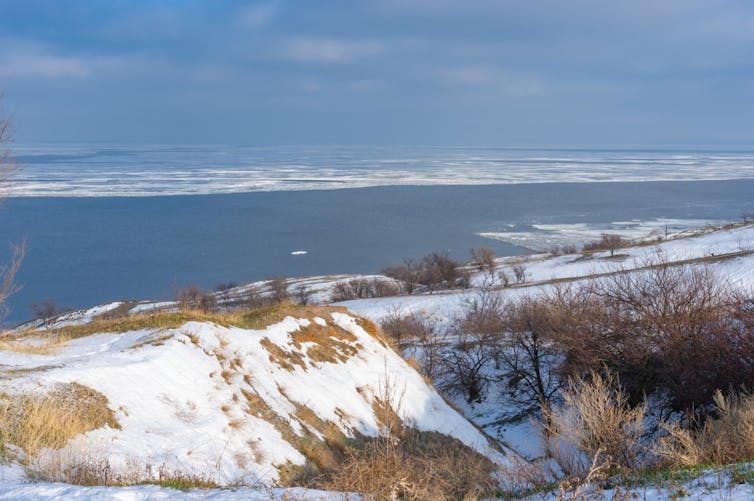From the start of his invasion of Ukraine, the Russian president, Vladimir Putin, has employed the threat of escalation to the use of nuclear weapons as a means to deter western support. He has aimed to spread fear in Europe as a means to undermining solidarity with Kyiv. And as his military fails to hold the gains it initially made in the south and east of Ukraine these threats have become louder.
But the use of a tactical nuclear weapon in Ukraine would be potentially catastrophic for Russia – both politically and militarily. And there would be little to gain in terms of the conflict itself.
So Russia is also demonstrating that there are many other rungs to climb on the escalation ladder before it gets to nuclear weapons. Most recently, the Kremlin has focused on destroying as much of Ukraine’s critical civilian infrastructure as possible. In particular, Moscow has used a combination of missile and drone attacks to target major Ukrainian cities, including the capital Kyiv, and the country’s power grid.
But there is more to this shift in Russian tactics. Putin’s personal history as a former KGB operative is the foundation on which he has perfected the art of multi-domain influence operations. These include cyber-attacks, propaganda and interfering in western politics. The targeting of Ukrainian infrastructure is just one piece of a larger puzzle that will also require a shift in the west’s response.
The threat of escalation is also being played as a psychological and political weapon. In phone calls to Nato countries, Russian defence secretary Sergei Shoigu has suggested that Ukraine is preparing the use of a dirty bomb to spread radioactive contamination in the Kherson region. This is seen as a potential false flag operation – blaming Ukraine for something Russia has done.
The US National Security Council has responded to this suggestion by stating that: “The world would see through any attempt to use this allegation as a pretext for escalation.” Similar concerns surround Russian suggestions that Ukraine plans to blow up the Kherson dam, flooding the entire region and depriving Ukraine of its hydroelectrical capacity. Kyiv reports that it is Russia that has mined the dam and Putin that would benefit most from its destruction. Escalations like this, which are hard to clearly identify culpability for, are both more attractive to Russia than nuclear use – and potentially as terrible.
Attacking infrastructure in Ukraine and beyond allows him to strike softer targets with potentially devastating effects. Apart from the physical pain inflicted on Ukrainians, these attacks are aimed at breaking the will of the Ukrainian people to resist. They are also designed to persuade Ukraine’s western backers that their support comes with too high a price for them.
In line with the idea of multi-domain influence operations, targeting critical civilian infrastructure goes beyond Ukraine. Airports in the US have been targeted by cyber-attacks, train operators in Germany similarly hit, and sections of the Nordstream 1 and 2 gas pipelines were recently destroyed.
While there is no publicly available proof of Russian culpability, the signs of Kremlin involvement are obvious. Yet Putin maintains a veneer of plausible deniability, which makes a decisive retaliatory response from the west more difficult. This is a classic KGB playbook: probing for vulnerabilities and testing resolve while maintaining the rhetorical threat of nuclear escalation without really having to go there – for now.
Is Putin winning now?
This two-pronged Russian approach also creates a dilemma for the west in the sense that choices have to be made between supporting Ukraine and strengthening one’s own defences. The west needs to improve defences of its own critical infrastructure while considering whether it should undertake its own reciprocal responses to these Russian attacks.

Developments on the ground, meanwhile, also point to a retrenching of Russian positions to more defensible ground on the left bank of the Dnipro. This means that Ukraine is unlikely to gain more ground in the south once its forces have reached the right bank of the Dnipro.
While Putin can thus consolidate at least part of his earlier territorial gains, the availability of Iranian drones – and personnel – will mean that Ukraine will be exposed to continuing pressure from Russia targeting its critical infrastructure.
The increasing cost of the war to Ukraine and the west – especially if Putin succeeds with more successful acts of sabotage there – is likely to increase, once again, calls for negotiations and a settlement between Kyiv and Moscow. These calls will only grow louder if, as predicted by some, the US mid-term elections return a Republican majority to Congress.
What the west must do
A Russian defeat in Ukraine, deemed likely by some just a few weeks ago, is no longer a foregone conclusion and certainly not imminent. In this situation, it is no longer enough for the west just to think about more sanctions and more military support for Ukraine. Of course, both of these are necessary – sanctions need to continue and they need to be extended and hit Iran as well and Ukraine needs more air defence systems and fast.
But the west also needs to think about its own defences, above all against the deniable Russian acts of sabotage against critical infrastructure of which some western capitals have had a first taste.
The current deterrence posture must be reconsidered. Containing Russia should also include options to apply pressure in other theatres – whether in its outposts in the South Caucasus and Moldova – or further afield in Syria, or in Africa. Deterrence is only as good as the credibility of retaliatory responses – it may be time for some western escalation that establishes clear boundaries for Putin and the consequences of breaching them.
The above article, written by Stefan Wolff (Professor of International Security, University of Birmingham) & David Hastings Dunn (Professor of International Politics in the Department of Political Science and International Studies, University of Birmingham), was first published in The Conversation





